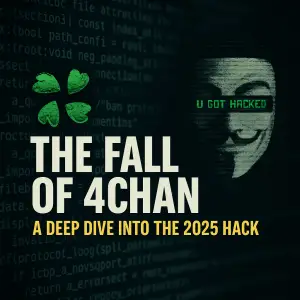The Fall of 4chan: A Deep Dive into the 2025 Hack
Founded in 2003 by Christopher Poole, 4chan is a legendary anonymous imageboard that has shaped internet culture through memes, activism, and controversy. Despite surviving numerous scandals, including accusations of fostering hate speech and supporting movements like QAnon and incel communities, 4chan faced an unprecedented challenge on April 14, 2025. A massive hack, attributed to users from rival imageboard Soyjak.party, exposed critical vulnerabilities and leaked sensitive data, raising questions about the platform’s survival. This article explores how the hack unfolded, what was compromised, the attackers’ motives, and the broader implications.
The Hack’s Execution
The breach was first noticed when the previously banned /qa/ board reappeared on 4chan with a taunting message: “U GOT HACKED” (WIRED). The attack, claimed by users from Soyjak.party, exploited multiple vulnerabilities in 4chan’s outdated infrastructure:
- Outdated Software: 4chan ran a nearly decade-old version of PHP and obsolete MySQL functions, both riddled with known security flaws (Know Your Meme).
- Ghostscript Vulnerability: The PDF upload system failed to validate file formats, allowing attackers to execute malicious code via a 2012 version of Ghostscript.
- EXIF Parser Flaw: An outdated C-based library for processing image metadata was susceptible to exploits due to poor support for proprietary camera formats.
These weaknesses enabled attackers to gain administrative access to 4chan’s backend. Posts on Soyjak.party suggested the primary attacker had been lurking in 4chan’s systems for over a year, indicating a meticulously planned operation (Decrypt).
Leaked Data
The attack resulted in the exposure of critical data, including:
| Data Type | Description |
|---|---|
| Source Code | 4chan’s source code, known as Yotsuba, was leaked. |
| Moderator Emails | Emails of moderators and janitors, including .edu and .gov domains, were exposed. |
| User Data | IP addresses of deleted posts and user activity statistics. |
| Internal Documentation | Internal documents and moderation templates, such as ban protocols. |
| Restored /qa/ Board | The previously banned /qa/ board was reinstated as a symbolic provocation. |
Sources like TechCrunch confirmed the authenticity of some leaked data through interviews with janitors, while screenshots of 4chan’s backend circulating online further validated the breach (Reuters).
Attackers’ Motives
The motives behind the hack appear rooted in a long-standing rivalry between 4chan and Soyjak.party. Established in 2020, Soyjak.party became a haven for users frustrated with 4chan’s moderation, which some argued diluted the platform’s original chaotic spirit (Cyber Daily). A key trigger was likely retaliation for the 2021 ban of the /qa/ board, a popular space for certain communities that clashed with others, such as /lgbt/.
Soyjak.party users celebrated the attack as “Operation Soyclipse,” highlighting the restoration of /qa/ and the exposure of moderators’ personal information as major victories (Decrypt). Posts on X speculated that the hack was also a response to stricter moderation on 4chan, perceived by some as a betrayal of its anarchic roots (Hindustan Times).
Consequences and Impacts
Threat to Moderator Anonymity
The leak of moderators’ and janitors’ emails, including those with .edu and .gov domains, poses significant risks to their safety. 4chan’s user base often resents moderators, and the exposure of their personal information could lead to harassment or worse. This concern was emphasized by WIRED, which highlighted the potential for doxxing.
4chan’s Future
The platform’s outdated infrastructure makes recovery challenging. Emiliano De Cristofaro from UC Riverside noted that modernizing 4chan’s systems could be prohibitively expensive, fueling speculation about its demise (Boing Boing). As of April 18, 2025, 4chan remains offline or unstable, with no official statement from administrators (Newsweek).
Broader Implications
The incident underscores the importance of cybersecurity for platforms handling sensitive content. 4chan’s reliance on outdated software made it an easy target, serving as a cautionary tale for other websites. Additionally, the leaked data could be valuable to law enforcement investigating extremist or illegal activities on 4chan (The Register).
Current Status
As of April 18, 2025, 4chan is still offline or intermittently accessible, as confirmed by thousands of users on Downdetector. Administrators have not responded to requests for comment, making it unclear whether or when the platform will recover. Some sources, like Consequence, suggest 4chan may be “gone forever,” though such claims remain speculative.
Conclusion
The April 2025 hack of 4chan marks a pivotal moment, exposing the vulnerabilities of anonymous platforms and the power of community rivalries. Whether 4chan survives or fades, this incident will leave a lasting impact on discussions about cybersecurity, anonymity, and the role of controversial platforms in the digital age. For 4chan users, caution is advised when downloading files or clicking links related to this incident, as they may contain phishing attempts or malware.
Key Citations:
- WIRED: Suspected 4chan Hack Could Expose Longtime, Anonymous Admins
- Reuters: Notorious internet messageboard 4chan has been hacked, posts claim
- Know Your Meme: April 2025 4chan Sharty Hack And Janitor Email Leak
- TechCrunch: Notorious image board 4chan hacked and internal data leaked
- Decrypt: 4chan Breach Exposes Internal Chaos, Data in Major Hack
- Cyber Daily: 4chan ‘hack’ claimed by rival imageboard Soyjak Party
- Hindustan Times: 4Chan data, emails and contact info leaked? Alleged hack
- Newsweek: Is 4chan Down? What We Know Amid Hack Reports
- Boing Boing: 4chan hacked, obliterated and unlikely to be back soon
- The Register: 4chan appears to have been compromised by rivals
- Consequence: 4chan Likely Gone Forever After Hackers Take Control












Post Comment